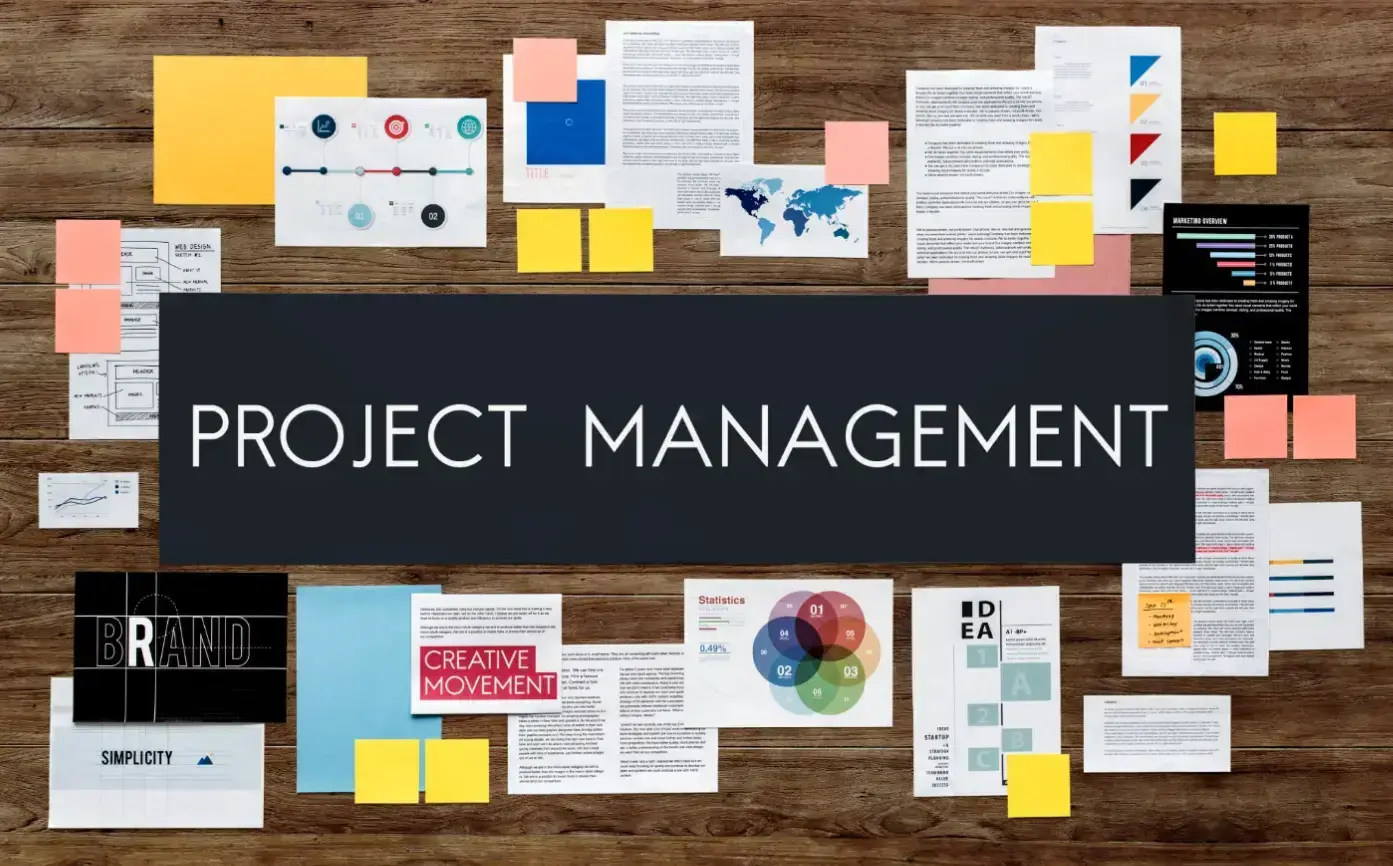Agencies thrive not only on successful project management; it is, in fact, a vital component for success in agencies of any size.
Statistics from 2024 (though still fresh) indicate that agencies using project management software are up to 92% more likely to achieve their projected objectives.
The project management software market is also growing rapidly, matching the demand. It is expected to reach $9.81 billion by 2025.
This is no surprise, but poor project planning and resource allocation continue to challenge many organizations. Inefficiencies in these areas cause 39% of projects to fail.
In this article:

From a human resources standpoint, 50% of project managers manage between 2 and 5 projects simultaneously, emphasizing effective resource management to avoid burnout and missed deadlines.
Automation significantly boosts productivity, with more than 54% of the workforce believing it could save them five hours per week.
Implementing automation in routine administrative tasks can save time for more strategic activities, enabling teams to focus on project-critical tasks.
Enhancing Project Management in Agencies: Key Strategies for Efficiency and Success
Regardless of their focus, agencies face constant challenges when managing multiple projects, clients, and teams simultaneously.
Effective project management ensures timely delivery, resource allocation, and smooth workflows.
The following sections provide actionable insights into enhancing agency project management. They focus on choosing the right tools and practices to streamline operations.
Finding the Right Software Solutions for Project Management

First things first, selecting the right project management software is an important step for agencies. This software is used to maintain control over projects and client relationships.
One example that is very commonly used is Monday.com. It is popular for its flexibility and ease of use, making it ideal for agencies managing both creative and operational tasks.
For agencies that need more lightweight, easy-to-implement project tracking, options like AttendanceBot plug into existing Slack or Microsoft infrastructure.
It supports custom workflows and task automation, ensuring teams stay on track with minimal manual oversight. Its integration with tools like Google Drive, Slack, and Jira enhances team collaboration.
Another strong contender is ClickUp, known for its free plan, which offers agencies features like task management, Gantt charts, and real-time collaboration.
This software is particularly helpful for agencies that handle creative workflows. It allows teams to track progress, manage deadlines, and collaborate seamlessly on design or marketing projects.
For agencies requiring deeper financial and project-tracking capabilities, Scoro stands out for its all-in-one platform. Scoro integrates project management, sales, financial tracking, and CRM, making it beneficial for professional service agencies.
Integrating Client Communication Tools
Effective communication with clients is often the key to project success in agencies.
Software like Honeybook excels in client management by providing a platform that includes invoicing, contracts, and client portals. This makes client interactions smoother, as all relevant documentation is stored and accessed on a single platform.
Honeybook’s AI-powered lead tracking also helps agencies stay ahead of client requests and manage high-value leads more efficiently.
Tools like Wrike are ideal for agencies working with international clients because they offer customizable client portals and real-time updates.
Wrike allows agencies to invite clients to view project progress, submit requests, and offer feedback within the platform, making communication transparent and seamless.
Streamlining Resource and Time Management

One of the biggest challenges for agencies is managing resources, doubly so when dealing with multiple projects.
Leveraging the right tools and tips for project managers can greatly improve visibility, planning, and time allocation, especially when juggling competing priorities.
Kantata is an advanced project management tool for resource planning and forecasting. Based on real-time data, it helps agencies predict project timelines, allocate resources, and manage team workloads.
Agencies can use Kantata to visualize potential bottlenecks before they arise, ensuring that projects remain on schedule and within budget.
For smaller agencies, Teamhood provides an intuitive platform for managing tasks, allocating resources, and tracking project progress using Kanban boards, Gantt charts, and time-tracking features. The platform is particularly useful for teams working in different time zones or managing multiple remote resources.
Managing Creative Projects with Custom Workflows
Agencies focused on creative work require a different set of tools. These tools must support custom workflows and allow for real-time collaboration.
Asana is a staple project management tool in the creative industry. It offers multiple views (Kanban, Gantt charts, lists) that help teams visualize and track project progress.
The standout feature of Asana is its workflow builder, which allows agencies to create custom workflows for different projects and ensures every task follows the necessary approval processes before completion.
Miro is another good choice; it's a platform designed specifically for brainstorming and visual collaboration.
Miro's infinite visual canvas is ideal for teams that need to collaborate on whiteboarding sessions or creative projects that require continuous iteration and feedback.
Tracking Project Profitability and Performance

Ensuring that projects remain profitable is one of the hard realities of agency life.
Productive is a project management tool that helps agencies track project profitability in real time. It includes features such as budget management, time tracking, and expense reporting.
This enables project managers to stay on top of financial performance throughout a project’s lifecycle.
Productive’s reporting capabilities provide a clear overview of profit margins, helping ensure projects are completed on time and remain financially viable.
Another good option, Workamajig, integrates financial reporting with project tracking to focus on financial health and project management. This tool is specifically designed for creative agencies and offers features for invoicing, budgeting, and financial forecasting.
Endnote
We’ve covered the basics of how project management breaks agency life, but the story doesn’t end here. The field is ever-evolving, and we can expect to see many changes in project management to come down the line.
The best approach for the future is to continue training in project management methodologies like Agile and Lean. These methodologies can help agencies stay adaptive and competitive in an ever-evolving marketplace.
These forward-thinking strategies will further enhance an agency's ability to manage complex projects and drive sustainable growth.
Frequently Asked Questions (FAQ)
1. Why is project management software important for agencies?
Project management software helps agencies efficiently manage multiple projects, clients, and teams by improving resource allocation, time management, and collaboration. Agencies that use project management software are up to 92% more likely to achieve their projected objectives.
2. What are the benefits of using project management software?
- Increased efficiency: Software automates routine tasks, saving valuable time and reducing human error.
- Improved collaboration: Tools like Slack, Google Drive, and Jira integrations enhance communication and streamline team collaboration.
- Better resource management: Helps track time, allocate resources, and avoid burnout by balancing workloads effectively.
- Financial tracking: Many tools integrate budgeting and expense management features to ensure projects stay within financial limits.
3. Which project management software is best for agencies?
The best tool depends on the agency’s needs:
- Monday.com: Ideal for agencies handling both creative and operational tasks, with custom workflows and automation.
- ClickUp is a great option for agencies with creative workflows. It offers features like task management, Gantt charts, and real-time collaboration.
- Scoro: Suitable for agencies that require deeper financial and project tracking capabilities, integrating project management, sales, and CRM.
- Wrike: Perfect for agencies working with international clients, with customizable client portals and real-time updates.
- Asana: Best for creative agencies, allowing custom workflows, Kanban, Gantt charts, and real-time collaboration.
- Kantata: Advanced project management tool tailored for resource planning and forecasting.
4. How does automation help in project management?
Automation saves time by handling routine administrative tasks like scheduling, task updates, and progress tracking. This allows team members to focus on higher-value tasks, such as strategic planning and project execution, improving overall productivity.
5. What is the role of client communication in project management?
Effective communication with clients ensures projects stay on track and meet expectations. Tools like Honeybook offer centralized platforms for managing contracts, invoicing, and client portals. Wrike also allows clients to track project progress, submit feedback, and stay updated on project timelines.
6. What tools can help with resource management and time tracking?
- Kantata: Offers advanced features for resource planning, forecasting, and managing team workloads.
- Teamhood: A simple solution for smaller agencies, providing Kanban boards, Gantt charts, and time-tracking tools for better task and resource management.
- Productive: Helps track project profitability, time, and expenses to ensure projects stay on budget and deliver on time.
7. How can agencies manage creative projects more efficiently?
Creative agencies can benefit from tools like Asana, which offers customizable workflows and visual tracking of project progress. Miro is another excellent option for teams needing a visual collaboration platform for brainstorming and ideation. It is perfect for continuous creative iteration.
8. How can agencies track project profitability?
Tools like Productive and Workamajig are specifically designed to track project profitability. They provide features like budget management, time tracking, and financial reporting to ensure projects are completed on time and remain financially viable.
9. How do project management tools integrate with other platforms?
Many project management tools, such as Monday.com and ClickUp, offer integrations with widely used platforms, such as Google Drive, Slack, Jira, and CRM systems. These integrations help streamline communication, document management, and overall workflow, ensuring that all team tools are synchronized.
10. What are the key strategies for improving project management in agencies?
- Select the right software: Choose a platform that suits your agency’s size, industry, and specific needs.
- Streamline communication: Use tools that facilitate clear, transparent communication with clients and teams.
- Optimize resource allocation: Track time and workload to avoid burnout and ensure project deadlines are met.
- Track profitability: Use software that enables real-time financial tracking to ensure projects are profitable.
11. What future trends should agencies look out for in project management?
The future of project management will likely see more widespread use of Agile and Lean methodologies, which promote flexibility, adaptability, and continuous improvement. Automation and AI-driven tools will also significantly streamline workflows and optimize resource management, allowing agencies to focus on more strategic work.

Author Bio
Scarlett is a junior student at Union College majoring in biomedical engineering with an interdepartmental minor in physics and computer sciences. She has found her passion in medical imaging and has always been excited about improving clinical diagnosis and treatment through computational methods and data analysis.

